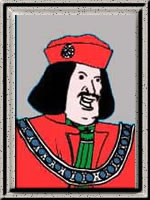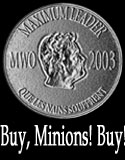Greetings, loyal minions. Your Maximum Leader has still not left for the beach. In part his delay is due to his having a wee bout of the summer pestilence. He doesn’t know how he picked up this virus, but he has been hacking, coughing, and sniffling something horrible. He’s not been fun to be around by any stretch. He’s felt so bad over yesterday and today that he’s only now gotten out of bed.
He will have to say that Villainette #1 (soon to be ten years old) was a tremendous help. She has a strong “mothering” streak to begin with (which sometimes is a problem when she attempts to dominate her younger siblings) but today her mothering streak was a great help to her father. She was able to bring water and flat ginger ale to him when he needed; and she kept a close eye on her younger brother while Mrs Villain was out. It was a blessing to have her.
So… Your Maximum Leader has been in bed and watching the crap that passes for tv programming. He has been watching the news about the (almost) car bombs in London and the car bombing in Glasgow. Both horrible events. Your Maximum Leader only hopes that the British people don’t draw the wrong conclusion from these events. The wrong conclusion being that an immediate withdrawal from Iraq will suddenly make the Islamists look to bomb other nations.
Immediate withdrawal from Iraq by Britain would be a type of appeasement. And as Winston Churchill once noted, to paraphrase, appeasers feed the crocodile in the hopes that it will eat them last.
That was your Maximum Leader’s pathetic segue into an interesting column he read on the Washington Post site entitled: “Why Winston Wouldn’t Stand for W.” In the peice Lynn Olson makes a number of observations with which your Maximum Leader agrees. Indeed, he agrees with more of Olson’s commentary that one might suspect. But, he feels that Olson is herself guilty of that which she describes as:
Writing about Churchill and Chamberlain, I’ve discovered, is like administering a Rorschach test to one’s readers. People see in Churchill and Chamberlain what they want to see. They draw parallels between the 1930s and the events of today according to their own political philosophy.
In drawing her own parallels between how dissimilar George W Bush is from Winston S Churchill, she doesn’t attempt to show that there might be some similarities as well. While your Maximum Leader is congnizant that Olson’s point in her peice is more to show Bush supporters (as well as Bush himself?) how you shouldn’t wrap Bush in the mantle of Churchill.
Now… Allow your Maximum Leader to go on the record. He is a great Churchill admirer. He keeps a smaller version of the same bust of Churchill on his desk as President Bush does in the Oval Office. And as he types this, the bust of Churchill stares at him from across the desk, and the Karsh photo of Churchill glowers down at him from the wall. And you know something else, your Maximum Leader would never have thought to compare Churchill and George W Bush. Ever. As much as your Maximum Leader loves Ronald Reagan, he would never compare Churchill and Reagan. Perhaps your Maximum Leader keeps his idols in their own temples and doesn’t like mixing them up. But, these figures are so different that comparisons will always fall short.
Now, your Maximum Leader does want to address some points which Olson makes in her piece. Frist off she writes:
Like Bush and unlike Churchill, [Neville] Chamberlain came to office with almost no understanding of foreign affairs or experience in dealing with international leaders. Nonetheless, he was convinced that he alone could bring Hitler and Benito Mussolini to heel. He surrounded himself with like-minded advisers and refused to heed anyone who told him otherwise.
Your Maximum Leader agrees that Bush had no foreign affairs experience on becoming President. But, this is a generally unfair characterization of the early Bush Administration. Does Olson forget that to compensate for his lack of experience Bush did bring on what (on paper at least) appeared to be one of the strongest foreign policy teams in recent memory. Your Maximum Leader remembers that as late as 2003 many of his liberal/Democratic friends felt that particularly in foreign affairs that Bush had the best team possible. Dick Cheney. Colin Powell. Condi Rice. That is one hell of a lineup. Your Maximum Leader doesn’t think that Olson’s comparison here rings true.
In the next paragraphs Olson states that:
Unlike Bush and Chamberlain, Churchill was never in favor of his country going it alone. Throughout the 1930s, while urging Britain to rearm, he also strongly supported using the newborn League of Nations — the forerunner to today’s United Nations — to provide one-for-all-and-all-for-one security to smaller countries. After the League failed to stop fascism’s march, Churchill was adamant that, to beat Hitler, Britain must form a true partnership with France and even reach agreement with the despised Soviet Union, neither of which Chamberlain was willing to do.
Your Maximum Leader agrees with Olson’s point. But he thinks it is important to point out the historical context here. Churchill knew that Britain couldn’t “go it alone.” Britain was deficient in air power and men-at-arms. Britain’s sea power was strong, but would likely come under great stress when war came. Churchill knew that Britain had to have allies - because she didn’t have the resources to fight. Britain in the 1930s is not America of 2001 or 2003. Your Maximum Leader believes that if Britain’s situation in 1939 was one of supreme economic and military ascendence (as one can argue America’s situation was in 2001) Churchill would have still sought an alliance with France and other European nations against Hitler. What troubles your Maximum Leader about Olson’s point here is that the casual reader might think that Britain’s situation was stronger than it was.
Of course, we all know that for a time Britain did have to “go it alone.” From the fall of France in June 1940 until America entered the war in December 1941, Britain was (mostly) on her own. What most American’s don’t know is that after the fall of France the consensus of the British political establishment was that Britain ought to seek terms for ending the war. Among Churchill’s cabinet there was (in May/June 1940) a majority that wanted to sue for peace with Hitler. Indeed, it was Churchill (and to his credit Clement Atlee) who wanted to fight on. This stubbornness is a similarity between Bush and Churchill that Olson didn’t feel the need to mention in her piece.
Olson again compares Bush to Chamberlain when she says that
Like Bush, Chamberlain also laid claim to unprecedented executive authority, evading the checks and balances that are supposed to constrain the office of prime minister. He scorned dissenting views, both inside and outside government. When Chamberlain arranged his face-to-face meetings with Hitler in 1938 that ended in the catastrophic Munich conference, he did so without consulting his cabinet, which, under the British system, is responsible for making policy.
All in all your Maximum Leader thinks this is a fair characterization, but again one that lacks historical context. Olson points out in the peice that Chamberlain’s Tories had a large majority in the Commons. But having a large Parliamentary majority isn’t quite the same as having a majority in the Congress. And executive power in a Parliamentary system is much different than our Constitutional system. Churchill himself was accused by many of wielding too much executive authority once he became Prime Minister. He wasn’t just Prime Minister, but was also the Minister of Defence. The closest analogy to this in our system would be George W Bush being President and Secretary of Defence at the same time. (But even that analogy isn’t all that exact.) It is interesting to note that one of the biggest criticisms of former-Prime Minister Tony Blair was that he acted more like a President than a Prime Minister.
All in all, the most troubling aspect of Olson’s essay in the Post (at least for your Maximum Leader) is that she oversimplifies the historical context to make her points. Of course, by adding context she diminishes the force of her argument; but if she fancies herself a serious historian she ought to stick to history and leave the political commentary to someone else.
Carry on.


